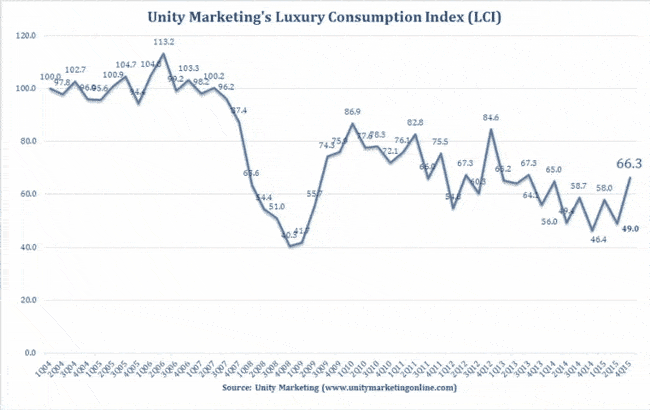Study Finds Upward Trend In Affluent Consumer Spending
Furniture World News Desk on
12/7/2015
Unity Marketing reported that there is good news and even better news for marketers aiming at the highest potential affluent customers in Unity Marketing's most recent affluent attitude and purchase behavior survey. The good news is that affluents increased their average three-month spending on high-end or luxury goods and services by 3.2% overall.
The even better news is that affluents' consumer confidence rose 17.3 points, as measured by the Luxury Consumption Index (LCI), the single biggest jump since 4Q2012. This according to a survey conducted in October 2015 tracking n=1,200 affluent consumers' high-end and luxury purchases for a three-month study period, as compared to results from three-month study period fourth quarter 2014.
"Finally, we can bring some good news to brands that depend upon the out-sized spending potential of the affluent consumer segment, the top 20% of U.S. households based on income," says Pam Danziger, president of Unity Marketing and lead researcher in the ACTS study.

"Affluent consumer confidence in fourth quarter 2015 posted the strongest uptick we've seen in the past three years. Since affluent spending on luxuries are purely discretionary, their feelings of confidence in their financial status is essential to getting them to loosen their purse strings, which they did over the past three months."
"While a 3.2% increase in luxury spending hardly reflects a booming luxury market, it is a positive turn. The key question is whether the affluent consumer segment will sustain a more positive outlook over the next six months. It hasn't been since 2011, the period immediately after the worst of the recession, that Unity Marketing has tracked a quarter-upon-quarter gain in affluent consumer confidence. Everyone's fingers should be crossed that we'll see a sustained increase in 2016," Danziger explains.
Affluents investing more in their homes
Contributing the greatest boost to affluent's spending this quarter was a 29.6% quarter-to-quarter increase in spending for high-end home luxuries.
Danziger says, "This remarkable increase in spending on home furnishings fits perfectly with affluent's focus on gaining the greatest return on their investment in spending. For example, buying a new handbag or outfit gives a momentary thrill, but once the newness wears off, it is just another thing in the closet."
"But investing in home improvements, like redesigning the closet or new kitchen appliances, is something that greatly improves the quality of your everyday life. So we track affluents picking up the pace in spending on home electronics; major home appliances, building products and bath fixtures; and linens, fabrics and soft goods," Danziger says.
Affluents investing in collectible personal luxuries that hold value
In the personal luxury space, affluents also picked up the pace on investments in jewelry and watches, both of which have inherent value, while spending on more disposable luxuries, like clothing, fashion accessories and beauty posted a decline.
Also up in the personal luxury space were wine and spirits, another highly collectible category, and personal electronics, which deliver enhance people's quality of life now that affluents are tethered to their internet connections 24/7.
Where affluents spend their money reveals what they really value
"Luxury is a state of mind, not a brand or a price point," Danziger comments. "With improved confidence in their financial status, affluents are choosing to spend where they get the greatest return on their investment as measured by improvements in their quality of life or that promise to hold their value."
"Brands need to position their product offerings around meaningful and measurable improvements they deliver to affluent's luxury lifestyle. They have to deliver meaning to the customer, which today is measured by the enhanced lifestyle experiences they offer," Danziger concludes.
Pam Danziger, president of Unity Marketing, will hold a
live webinar on Wednesday December 16 @ noon Eastern to review the latest ACTS Shopper Track survey, as well as learn about marketing luxury in a brand new style focused on the needs, desires and lifestyles of today's affluent consumers.
This 50-minute webinar will reveal the way to reach today's more value-driven luxury consumers by telling new stories about luxury that meets their current needs and fits their current mindset. The session will also be recorded for later listening and webinars attendees will receive a copy of the presentation for study.
About Pam Danziger & Unity Marketing: Speaker, author, and market researcher Pamela N. Danziger is internationally recognized for her expertise on the world's most influential consumers: the American Affluent. Her new mini-book,
What Do HENRY's Want?, explores the changing face of America's consumer marketplace. As founder of
Unity Marketing in 1992, Pam provides brands with actionable insights into the minds of their most profitable customers.
Pam received the 2007 Global Luxury Award for top luxury industry achievers presented at the Global Luxury Forum by Harper's Bazaar. Luxury Daily named Pam to its list of "Women to Watch in 2013." She is a member of Jim Blasingame: The Small Business Advocate's Brain Trust and a contributing columnist to The Robin Report, a monthly newsletter for senior executives in the retail, fashion, beauty, consumer products and related industries.
Pam is also author of Putting the Luxe Back in Luxury: How new consumer values are redefining the way we market luxury (Paramount Market Publishing, 2011). Her other books include Shopping: Why We Love It and How Retailers Can Create the Ultimate Customer Experience, published by Kaplan Publishing in October 2006; Let Them Eat Cake: Marketing Luxury to the Masses-as well as the Classes, (Dearborn Trade Publishing, $27, hardcover) and Why People Buy Things They Don't Need: Understanding and Predicting Consumer Behavior (Chicago: Dearborn Trade Publishing, 2004).